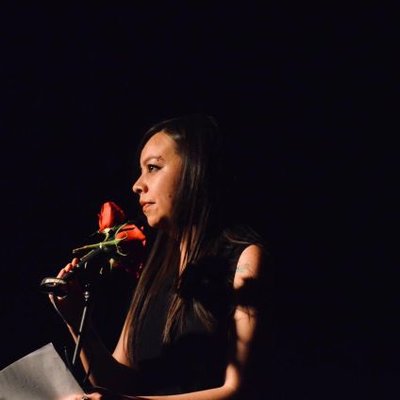Livina Santos (Guayaquil, 1959) is an Ecuadorian writer and educator known for her contributions to feminist literature in Ecuador. She gained recognition with her short story collection Una noche frente al espejo (1989), which explores themes such as gender roles, societal repression, and existential issues through a feminist lens. A former member of the Advanced Literature Workshop at the Central Bank of Ecuador, she has also contributed to various literary anthologies. Alongside her literary career, Santos has taught literature and led numerous literary workshops, shaping the literary landscape of Ecuador.
Early Life and Education
Livina Santos was born in Guayaquil, Ecuador, in 1959. She pursued higher education at the Universidad Católica de Santiago de Guayaquil, where she earned a degree in Sciences of Education, with a specialization in Spanish Language and Literature. Her academic pursuits extended further, as she later obtained a Diploma in Strategic Thinking and Prospective for Higher Education, in collaboration with the Universidad Tecnológica Equinoccial and the Universidad Externado de Colombia. This educational background laid the foundation for her future career as both a writer and an educator.
Literary Career
Santos emerged as part of a prominent group of female Ecuadorian writers in the late 1980s. Alongside writers like Gilda Holst, Liliana Miraglia, and Marcela Veintimilla, she was a former member of the Advanced Literature Workshop of the Central Bank of Ecuador, led by Miguel Donoso Pareja. This collective is considered a pivotal influence in shaping contemporary Ecuadorian women’s literature. Their works, including Santos’ contributions, remain essential references for the study of literature written by Ecuadorian women.
In 1989, Santos published her first short story collection, Una noche frente al espejo, which is considered one of her most significant works. Her stories often explore the role of women in a patriarchal society, dealing with themes such as sexual harassment, gender roles, and self-repression, as seen in stories like “Rosas rojas para mi secretaria”, “Trastoque”, and “De regreso a casa”. Her writing combines a simple yet profound style, reflecting the complexities of everyday life and societal pressures.
However, Santos’ thematic scope is not limited to women’s issues. She addresses broader existential concerns, such as emotional disconnection, love conflicts, and LGBTQ+ themes, including the portrayal of homosexuality and AIDS in stories like “Figuras para desarmar”. Her ability to blend the mundane with deeper existential reflections solidifies her standing as an important figure in Ecuadorian narrative.
In addition to her own publications, Santos has been featured in several anthologies, including Nueva narrativa ecuatoriana (Hispamérica, 1987), El lugar de las palabras (Quito), and Cuarenta cuentos ecuatorianos (Guayaquil, 1997), further establishing her as a key voice in the literary scene.
Academic and Teaching Career
Beyond her literary work, Livina Santos has had a distinguished academic career. She has taught for over ten years at the Universidad Católica de Santiago de Guayaquil, offering courses on Contemporary Literature, Introduction to Linguistics, and Creative Composition. She also taught literature at various high schools in Guayaquil, including Logos and Santiago Mayor, demonstrating her commitment to educating future generations about literature and language.
Santos has also led numerous literary workshops since 1996, helping cultivate the analytical and creative skills of aspiring writers and readers. One of her notable initiatives was a Literary Reading Workshop, where she provided participants with tools to better understand and analyze short stories and novels.
Personal Life
Livina Santos’ personal experiences and struggles have deeply influenced her writing. In interviews, she has spoken about the challenges of balancing her creative voice with the demands of everyday life, which at times led her to take extended breaks from writing. This struggle, she believes, is representative of the experiences of many women in male-dominated societies, where both societal expectations and internal conflicts can stifle creativity. After a 15-year hiatus, she returned to writing with a renewed sense of exploration, aiming to find new voices and techniques.
Legacy and Influence
Santos is considered a pioneering voice in Ecuadorian literature, particularly in the realm of feminist writing. Her work not only confronts the realities of life for women but also delves into the complexities of human relationships and existential struggles. Critics have praised her for her simple, yet profound narrative style. Her stories have been well-received for their relatable themes and emotional depth.
Livina Santos continues to influence contemporary Ecuadorian literature, especially through her active participation in literary forums and conferences. In 2021, she took part in the VII Encuentro de Libre Libro, where she discussed the role of women in literature and the challenges of writing in a country like Ecuador, where short stories are a significant part of the literary tradition. Her contributions, alongside other notable authors, have enriched the national literary dialogue and helped shape the future of Ecuadorian storytelling.
Selected Works
- Una noche frente al espejo (1989) – A collection of short stories exploring themes such as gender roles, societal repression, and existential issues.
Anthologies:
- Nueva narrativa ecuatoriana (Hispamérica, Gaithersburg, Md., USA, 1987) – Santos’ works appeared in this anthology featuring new Ecuadorian narrative voices.
- El lugar de las palabras (Quito) – A collection of notable Ecuadorian literature.
- Antología de narradoras ecuatorianas (Quito, 1997) – An anthology showcasing Ecuadorian women writers.
- Cuarenta cuentos ecuatorianos (Guayaquil, 1997) – A selection of Ecuadorian short stories.
- Antología básica del cuento ecuatoriano (Quito, 1998) – A foundational anthology of Ecuadorian short stories.
References
- Academia Ecuatoriana de la Lengua, “Gilda Holst y Liliana Miraglia, sus primeros cuentarios, por Don Raúl Vallejo.” Retrieved on October 14, 2024. Click to view.
- Ecuador Art y Dis, “Taller de Lectura Literaria.” Retrieved on October 14, 2024. Click to view.
- Ecuador Art y Dis, “Taller de Lectura Literaria.” Retrieved on October 14, 2024. Click to view.
- Literatura Ecuatoriana, “Livina Santos.” Retrieved on October 14, 2024. Click to view.
- Universidad de las Artes Libre Libro, “En el VII encuentro de Libre Libro 2021, autores concluyen que ‘Ecuador es un país para cuentistas’.” Retrieved on October 14, 2024. Click to view.

